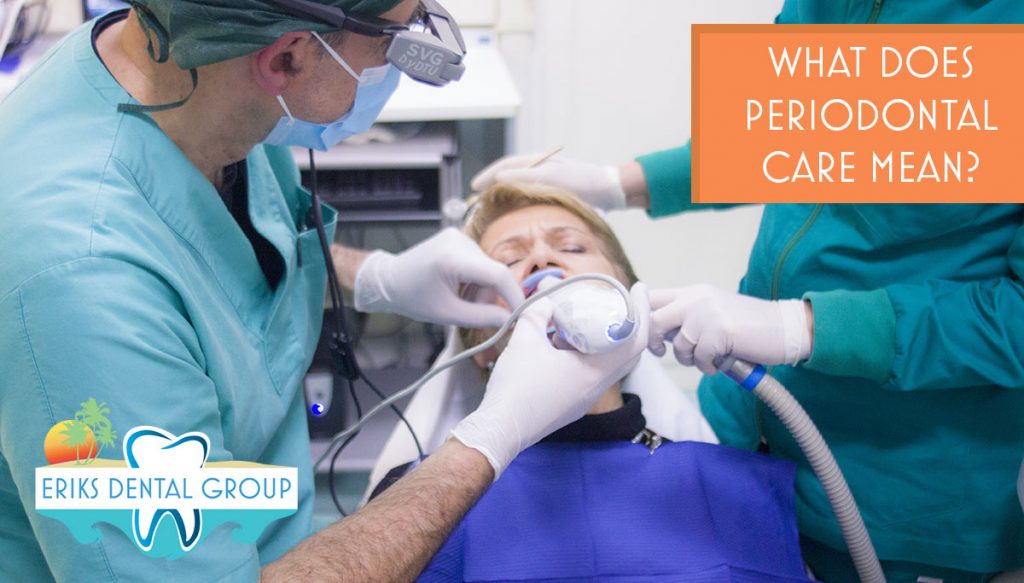A smile has the power to make someone’s day or melt someone’s heart. The joy that comes with a quick flash of your pearly whites is contagious, but what if you’re struggling with gum discomfort or an infected tooth?
Periodontal care is an important part of a dental hygiene regime. It reduces the risk of periodontal disease and makes sure that you continue to smile with confidence.
Let’s explore the basics of periodontal care, its benefits, and the difference between regular cleaning.
What Is Periodontal Care?
Periodontal care is also known as periodontal maintenance or deep cleaning. It involves the process of thoroughly cleaning the teeth to prevent the development of periodontal disease.
If you have existing problems with your oral health, then a visit to the periodontist is recommended every three to four months. Making sure that you stick to these appointments offers the following benefits.
- Tartar and plaque removal that develops above and below the gum line
- Added confidence by removing yellow stains on teeth
- Fresher breath by removing plaque, calculus, and bacteria
- Early identification of oral health issues
What’s Included in Periodontal Maintenance?
Periodontal maintenance care comes in different forms, depending on the health condition of your oral hygiene.
Some of the most common methods of periodontal maintenance methods include.
- Supragingival cleaning which includes scaling tools to get rid of plaque and calculus on the gum line
- Subgingival cleaning involves removing calculus and bacteria from below the gum line and the gum pockets
- Scaling and root planing which remove bacteria from the tooth root
- Antibiotic or antimicrobial cream to promote fast and healthy healing after scaling and root planing
- X-ray examination to study bone and gum recession and identify future risks
The Difference Between Periodontal Care and Regular Cleaning
It’s important to note that periodontal care and regular cleaning involve slightly different methods of oral hygiene. So, what’s the difference between regular dental cleaning and deep cleaning?
Regular Cleaning
Regular dental cleaning is a preventative routine, also known as prophylaxis. Dental experts recommend a dental cleaning once or twice a year to prevent dental problems from developing.
Regular dental cleaning typically involves an assessment of the mouth before the removal of bacteria and plaque. In most instances, regular cleaning will end with polishing and flossing.
Periodontal Cleaning
While periodontal cleaning is similar to regular cleaning, there are a few differences. Most notably, periodontal cleaning is usually routine for patients with existing problems, so the appointments are more frequent.
The routine includes the same removal of bacteria as regular deep cleaning, as well as scaling and root planing. Experts will also examine the pockets of your gums for infection or inflammation that needs to be treated.
Risk of Periodontal Disease
Periodontal cleaning plays an essential role in preventing and managing periodontal disease. Also known as gum disease, the issues are caused by the excessive build-up of bacteria.
Periodontal disease refers to an infection in your gums and the damage caused to surrounding soft tissue in your mouth (as well as teeth in severe instances).
When left unattended, periodontal disease can lead to infection, inflammation, bone loss, and further health issues such as diabetes and heart disease.
While there are ways to treat gingivitis at home, it’s best to contact a dental expert if you notice any of these symptoms.
- Swollen or puffy gums
- Bright red or purple gums
- Bleeding gums
- Tender gums
- Bad breath
- Pain when chewing
- Loose teeth
- Spaces developing between your teeth
- Receding gums
Reliable and Friendly Periodontal Care in Boynton Beach
Whether you’re experiencing symptoms of periodontal disease, or you want a regular check-up, our expert team at Eriks Dental Group is ready to serve you with a smile. We provide comfort and care for all dental procedures – from regular cleaning to periodontal maintenance.
Give us a call at 561-733-4004 to find out more, or request an appointment online.

